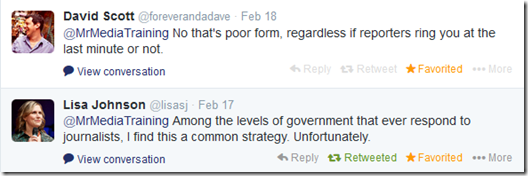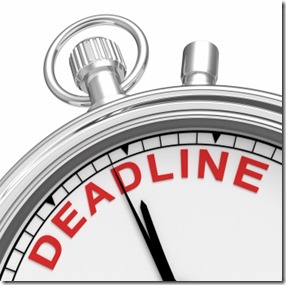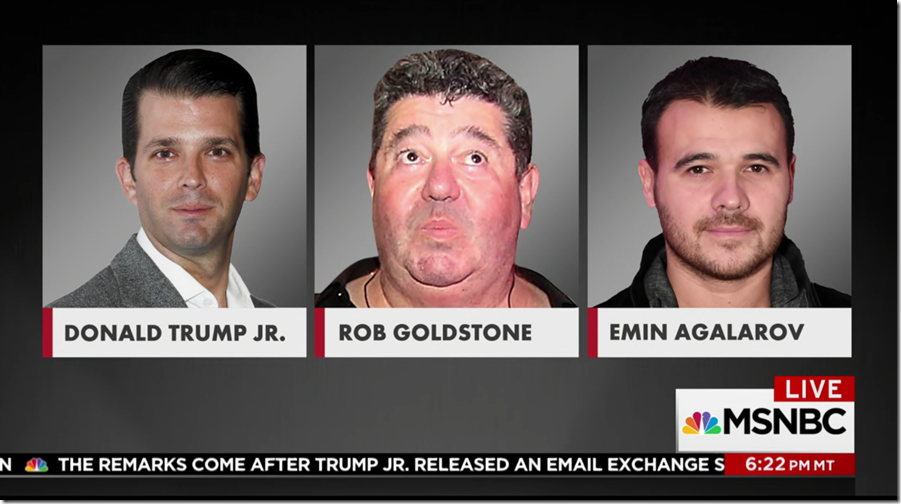Your Responses: Is This Smart or Dangerous PR Strategy?
Last week, I asked whether it is ever a smart media relations strategy to wait to return a reporter’s call until just before the deadline. By doing so in specific circumstances, I wrote, you might be able to minimize your role in the story while preventing the reporter from writing that you refused to comment.
You had a lot to say on this topic—thank you for all of your thoughtful comments!—and as I suspected, you had a wide range of opinions. Below are some highlights; you can also read the complete comments in the comment section of this post.
Many of you said that waiting until just before the deadline was bad form, as expressed in the following tweets:
Reader Adam Myrick agrees that waiting is bad form:
”I’ve always gone with a customer service-flavored model of media relations. I look at the reporters and editors I work with as customers. I strive to provide them with a level of access and information that is befitting of a customer receiving any other service. Providing them with information right before ‘closing time’ strikes me as bad customer service.”
Stu Opperman, APR takes a similar take:
“In my experience, reporters will often claim a deadline time that is often earlier than the actual deadline. This happens for a variety of reasons, one of which is to thwart the ’4:58 crowd’ from working the system. Since you never really know if the deadline stated is the true deadline, it has always been my recommendation to position the appropriate message(s) as you feel is best, regardless of timing. If your goal is to keep your client’s connection to the story to a minimum, keep your comments short and to the point and don’t have further conversation/correspondence about the situation.”
But other readers disagreed, arguing that waiting until just before a reporter’s deadline has its benefits. Bill Zucker writes:
“There is at least one situation in which there is little advantage in answering early. If, because of legal complications or the facts in the story, your company will not be in a position to go beyond a short statement — then there is little reason to answer early. Giving time for follow up doesn’t help you.”
But Bill smartly points out that:
“Deadlines are not what they used to be…waiting until deadline hoping to avoid a follow up question will not generally be effective for stories that are posted and updated online.”
Kent agrees:
“I would agree with Bill that you only do it when there’s not much you can say, and would add that you only do it with a reporter you know or suspect to be hostile.”
But he shares this anecdote about a time when that strategy backfired:
“When I first started doing PR at a college, I didn’t have the information to provide a news director who called about a controversy. I pledged to get back to her when I had somebody for her to talk to, but rather than wait she sent a reporter out to talk to anybody she could find…it could…have spun out of control at that point.”
John Barnett sees both sides:
”There is a risk of being left out anyway after waiting so long, or the reporter decides you are hiding something, feels played and then adjusts his or her story toward that angle…So I call it a risk — but argue that risks are strategies.”
And he also points out that reporters use a similar tactic in reverse:
“I would also suggest it works both ways, since reporters working a juicy gotcha story can wait until the last minute to call you for a quote or information in order to put you off-message and limit your options for a reply that meets their deadline.”
Finally, one reader who requested anonymity shared an interesting story about his company’s crisis communications regarding the new healthcare marketplace:
“I handle PR [for] a large health insurer, and with the marketplace enrollment issues everyone is having, local TV stations have been finding members who need coverage and using their stories as a way to attack insurance companies…
A couple of weeks ago we were contacted by a member of the local TV media — a reporter who has a history of going aggressively against us whenever possible…
First off, we solved the member’s issue, but as we all know, that was just to crack to door open for the reporter, she was filing the story regardless of the members’ outcome.
I had no intention of putting our executive on air…I had previously witnessed how other local TV stations cut and sliced a seemingly innocent interview with this executive and turned it negative…So I put together a statement from the company, but made it appear as if it was crafted specifically and only for this one reporter, and sent it to her an hour before her deadline.
I did not take her follow up calls, as she also had a tendency to use phone conversations with the PR staff as official comments from the company, and I did not want our off-hand comments to defuse the message of the statement…
The story ran, and not only did she show the statement on air (on our letterhead with logo), she actually read part of the statement in her story…To me, this was a win.”
Thank you for your great comments! If you would like to add any additional thoughts, please use the comments section below.





